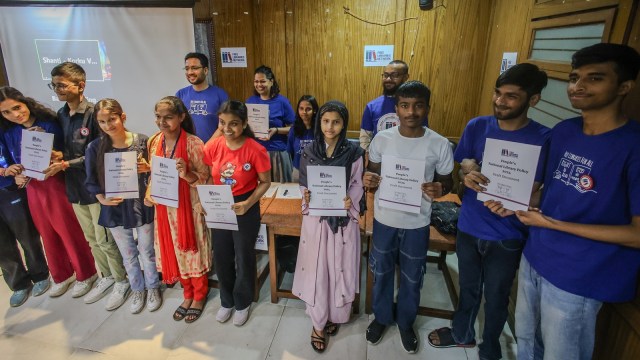‘Free libraries for all’: Here’s policy memo on how it is done
The memo seeks to establish a standard for what qualifies as a decent library and establish a curriculum for librarians so they can become ‘repositories for delivering constitutional rights’ instead of being ‘merely record keepers’.
 Members of Free Library Network during a press conference at Press Club in Delhi on Saturday. (Express Photo by Praveen Khanna)
Members of Free Library Network during a press conference at Press Club in Delhi on Saturday. (Express Photo by Praveen Khanna)Braving a rainswept city, children and teens from all around the country – some virtually, some physically – gathered at Delhi’s Press Club Saturday evening to advocate for the right to read, to information, and to a library. The Free Libraries Network (FLN), a collective of more than 250 libraries around South Asia, released a policy memo ‘The People’s National Library Policy 2024’, drawn from years of coordination and activism at the grassroots level, to bolster a movement they believe to be the foundation of the Indian Constitution’s ideals of equity and justice – on the eve of Dr BR Ambedkar’s birth anniversary. All their libraries are fiercely anti-caste, feminist and disability-friendly, and above all, free.
Why? Won’t people steal expensive books? Mustn’t there be some entry barriers to maintain security? “The mindset has to change that, oh, there is an excellent library in the centre of the city some of us can access, so why are we caring? There is an anxiety that if we involve and welcome everybody, there will be some kind of downgrading (of quality). That doesn’t happen. Yes, when you break caste or gender barriers, issues crop up… but you work with it because that’s the world you live in,” said Purnima Rao, director, FLN.
The memo seeks to establish a standard for what qualifies as a decent library and establish a curriculum for librarians so they can become ‘repositories for delivering constitutional rights’ instead of being ‘merely record keepers’. It also seeks to decentralise control so individual communities can decide how to start and run their local libraries, with help from union and state governments as well as bodies like the National Digital Library and Raja Rammohun Roy Library Foundation (RRRLF). It also advocates for robust data collection –according to the union government, of a total of 27,671 government-run libraries in India, only 7,836 exist outside southern states like Kerala, Tamil Nadu and Karnataka.
“When I went to these libraries, it’s not just a place for books. It’s a place where we can share our thoughts. A library makes me feel safe and confident. When I first joined as a member, I only went to listen to stories. But over time, I developed a new way of thinking wherein I could see how so much injustice is done to people with my identity,” said Rajni, a member of The Community Library Project (TCLP), part of FLN.
“The library is a great tubewell. There’s high unemployment among even the educated in India. Libraries are going to become a highly politicised issue. We are entering the fray because no one else is advocating for this,” said Mridula Koshy, a TCLP leader, referring to book bans around the world and reducing catalogues in public libraries.
But there is already legal precedent. The Bureau of Indian Standards has criteria for libraries, albeit not updated in the last two decades. There’s a draft policy submitted in 1986 by RRRLF, as well as SR Ranganathan’s Model Library Act which has been adopted in Tamil Nadu and modified in other southern states. “With this memo, we build on these guidelines for today’s library science, and take reference from Ambedkar’s writing that if you dine together, you annihilate caste. If you can sit in a library together, you annihilate caste,” said Koshy.







